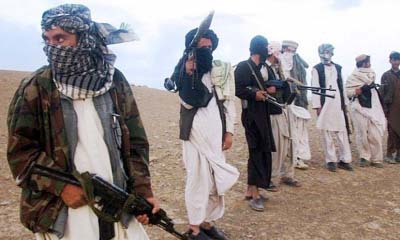
AFP, Kunduz :
Foreign fighters allied with the self-styled Islamic State (IS) are training Taliban militants in a volatile Afghan province, an official said on Friday, the first such claim as the government raises the alarm over an emerging IS threat.
President Ashraf Ghani has repeatedly raised fears that IS militants – notorious for their brutal reign of terror in Syria and Iraq – are making steady inroads into Afghanistan, which is already in the grip of a fierce Taliban militancy.
But the governor of Kunduz, the scene of intense fighting for two weeks that has displaced thousands, has gone a step further by claiming that the two groups are joining forces in the northern Afghan province.
IS fighters are “supporting the Taliban, training the Taliban, trying to build the capacity of the Taliban for a bigger fight”, provincial Governor Mohammed Omar Safi told the BBC.
Local observers have viewed claims about the rise of IS in Afghanistan with caution. The Middle Eastern group has never formally acknowledged a presence in Afghanistan and most self-styled IS insurgents in the country are thought to be Taliban turncoats.
The two groups, which espouse different ideological strains of Islam, are believed to be arrayed against each other in Afghanistan’s restive south, with clashes frequently reported.
But the governor insisted that the fight is different in the once-tranquil north, which has recently seen a huge influx of foreign fighters from countries such as Chechnya, Pakistan and Tajikistan.
“In the worst affected Imam Sahib district, (IS) fighters are training and supporting local Taliban fighters to raise their capacity… in their fight against the Afghan government,” the governor’s spokesman Abdul Wadood Wahidi said.
Last month hundreds of militants came within six kilometres of Kunduz city just hours after the Taliban launched their annual spring offensive, in the most serious threat to any provincial capital since the US-led 2001 invasion of Afghanistan.
The militants have since been pushed back after Afghan reinforcements were brought in from other frontlines, but the fighting still continues to rage on the fringes of the city.
Tens of thousands of people have been displaced due to the clashes, with aid agencies warning of dire living conditions for those who have fled their homes and moved to the city centre.
Foreign fighters allied with the self-styled Islamic State (IS) are training Taliban militants in a volatile Afghan province, an official said on Friday, the first such claim as the government raises the alarm over an emerging IS threat.
President Ashraf Ghani has repeatedly raised fears that IS militants – notorious for their brutal reign of terror in Syria and Iraq – are making steady inroads into Afghanistan, which is already in the grip of a fierce Taliban militancy.
But the governor of Kunduz, the scene of intense fighting for two weeks that has displaced thousands, has gone a step further by claiming that the two groups are joining forces in the northern Afghan province.
IS fighters are “supporting the Taliban, training the Taliban, trying to build the capacity of the Taliban for a bigger fight”, provincial Governor Mohammed Omar Safi told the BBC.
Local observers have viewed claims about the rise of IS in Afghanistan with caution. The Middle Eastern group has never formally acknowledged a presence in Afghanistan and most self-styled IS insurgents in the country are thought to be Taliban turncoats.
The two groups, which espouse different ideological strains of Islam, are believed to be arrayed against each other in Afghanistan’s restive south, with clashes frequently reported.
But the governor insisted that the fight is different in the once-tranquil north, which has recently seen a huge influx of foreign fighters from countries such as Chechnya, Pakistan and Tajikistan.
“In the worst affected Imam Sahib district, (IS) fighters are training and supporting local Taliban fighters to raise their capacity… in their fight against the Afghan government,” the governor’s spokesman Abdul Wadood Wahidi said.
Last month hundreds of militants came within six kilometres of Kunduz city just hours after the Taliban launched their annual spring offensive, in the most serious threat to any provincial capital since the US-led 2001 invasion of Afghanistan.
The militants have since been pushed back after Afghan reinforcements were brought in from other frontlines, but the fighting still continues to rage on the fringes of the city.
Tens of thousands of people have been displaced due to the clashes, with aid agencies warning of dire living conditions for those who have fled their homes and moved to the city centre.

